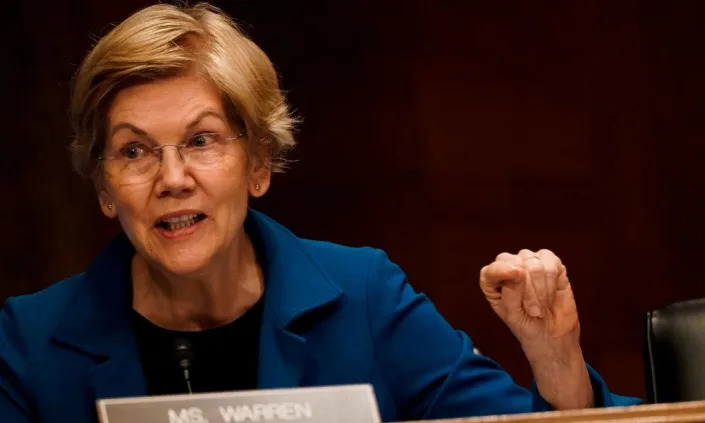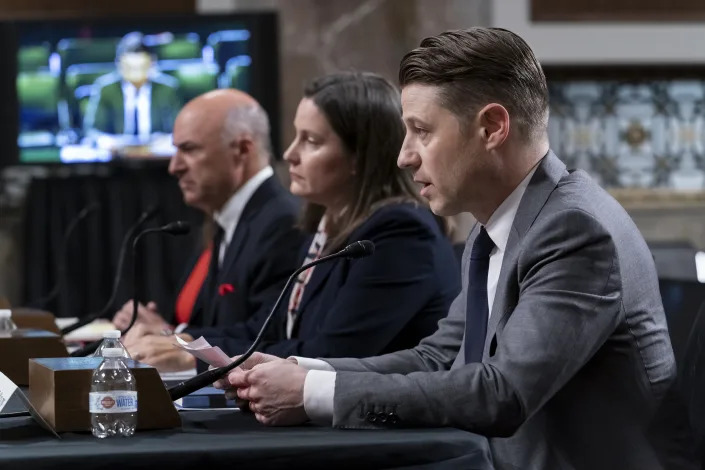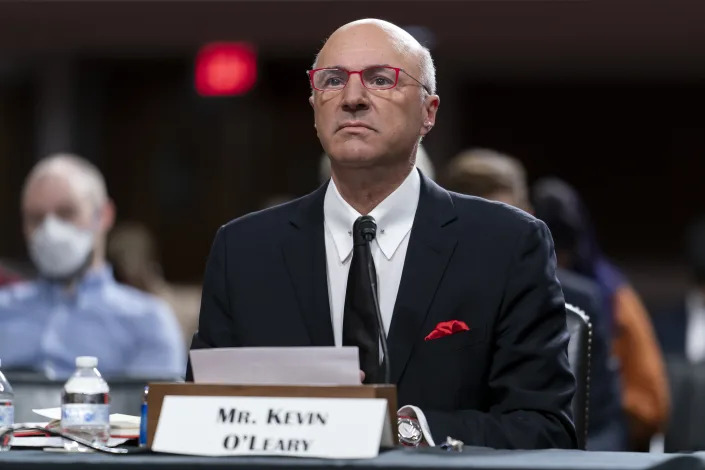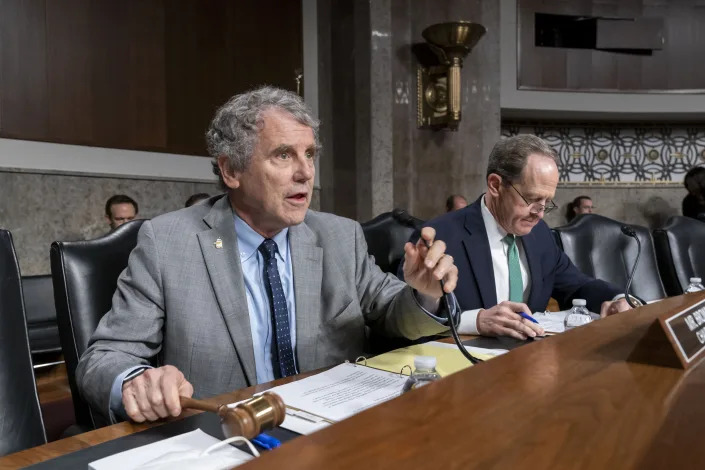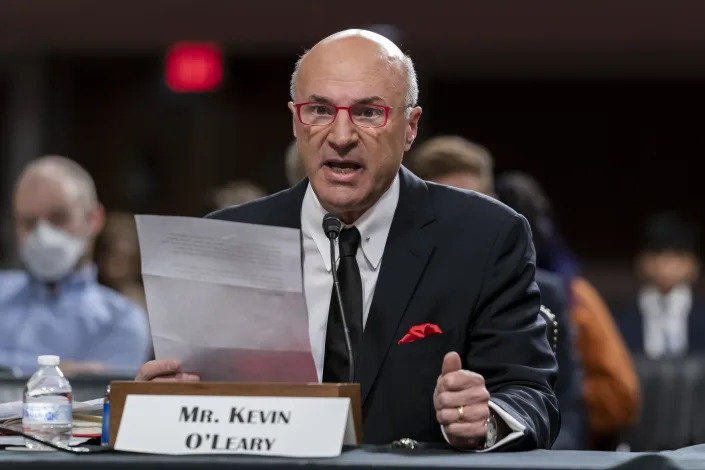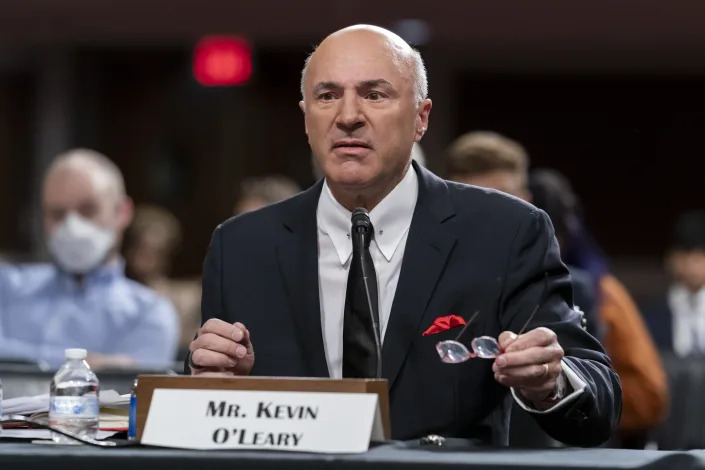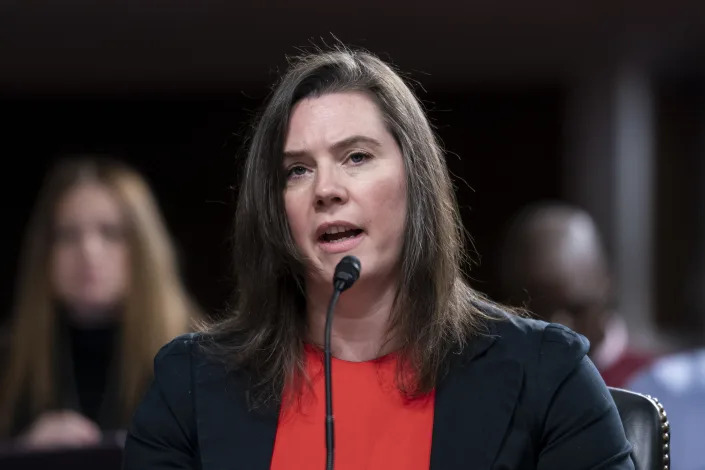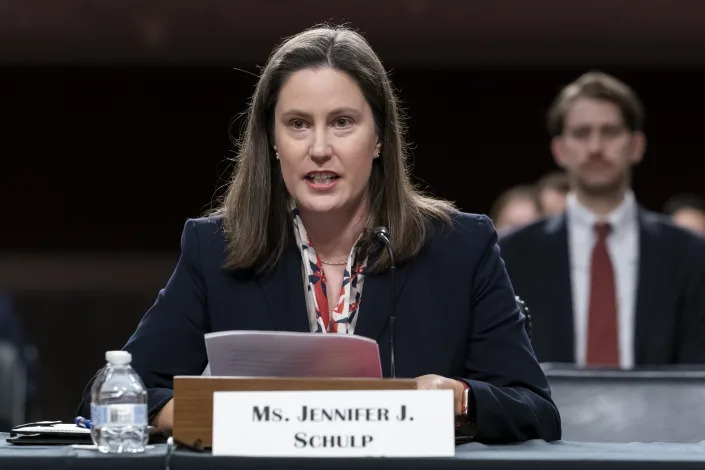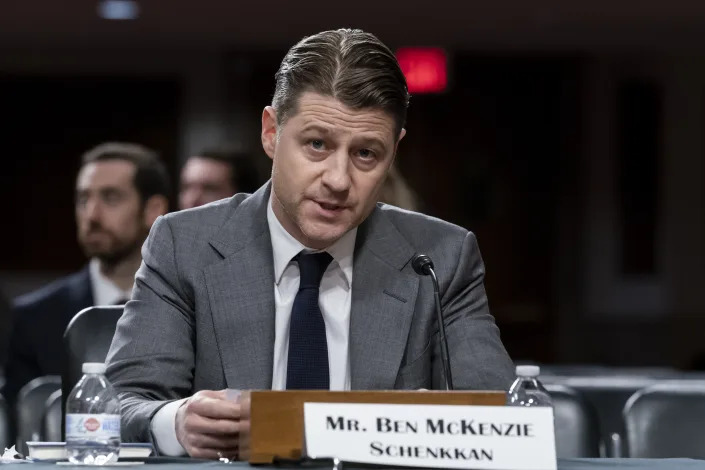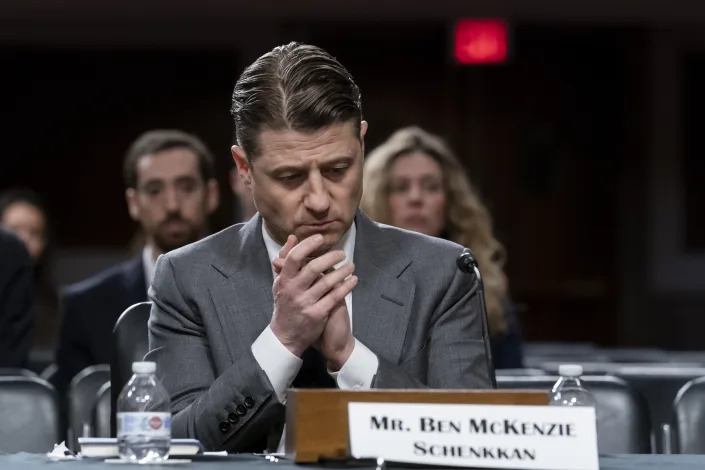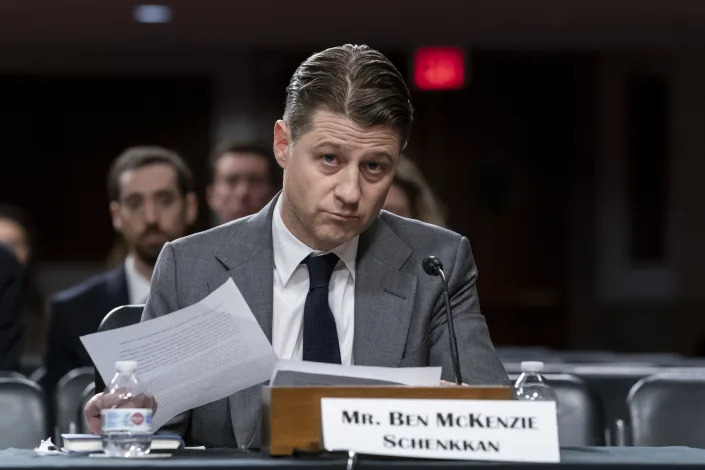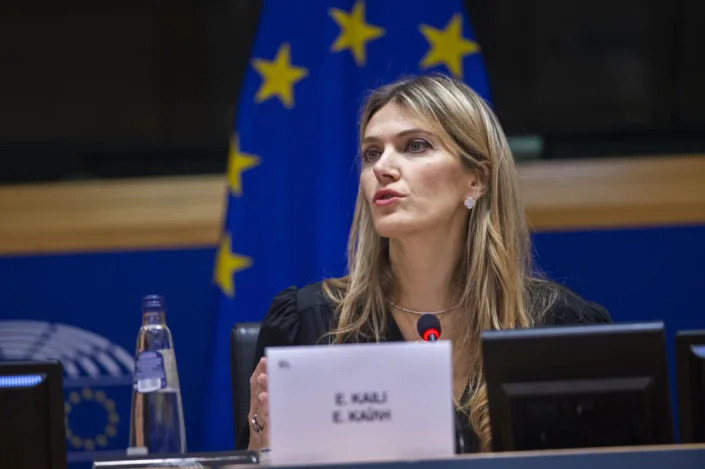Alexandra York
Tue, December 13, 2022

Sam Bankman-Fried, the founder and CEO of FTX.Alex Wong / Getty Images
The SEC charged Samuel Bankman-Fried with defrauding investors in FTX.
Bankman-Fried was interviewed at the DealBook Summit about his company's collapse on November 30.
The FTX founder said he "didn't know exactly what was going on."
Sam Bankman-Fried, the once-billionaire founder of the cryptocurrency exchange FTX, has been charged with defrauding investors by the SEC and was arrested on December 12.
Weeks earlier, he told Andrew Ross Sorkin of The New York Times that he wasn't aware of the details that led to his company's implosion in November.
"I didn't know exactly what was going on," Bankman-Fried, 30, told the Times on November 30. "Obviously, that's a pretty big mistake and oversight, that I wasn't more aware."
But convicted scammer Anna Sorokin told Insider that Bankman-Fried's apology press tour is insincere garbage.
"He's just trying to save himself," she said.
Sorokin isn't the only one to balk at Bankman-Fried's explanation. Bankman-Fried's defense isn't acceptable for business leaders who should know the inner workings of their companies. However, it is an excuse that other villainized founders have tried and failed to use in the past, like Elizabeth Holmes, the founder and CEO of the now-defunct Theranos.
"Generally speaking, when you go into these types of cases, there's two types of defenses: 'I didn't know' and 'It wasn't me,'" Neama Rahmani, the president of the law firm West Coast Trial Lawyers and a former federal prosecutor, previously told The New York Times of Holmes' case.
Once valued at $32 billion, FTX filed for bankruptcy and Bankman-Fried stepped down as CEO in November. Meanwhile, multiple billions are owed to creditors, and the Department of Justice and Securities and Exchange Commission are investigating FTX.

Michael M. Santiago/Getty Images
'I didn't know' was his only defense
Sorkin started his interview by noting there are two views of what occurred at FTX. The first is that Bankman-Fried is a young founder who made a series of terrible decisions. The second is that he committed a Ponzi scheme that took advantage of the relationship between FTX and Alameda Research, a trading firm that Bankman-Fried cofounded in 2017. Bankman-Fried denied the latter allegations, saying, "I did not ever try to commit fraud on anyone."
"I haven't been running Alameda. I haven't been thinking about its finances," he said. "I haven't been making those decisions. But as CEO of FTX, it was still my duty to make sure someone was doing diligence."
Holmes took a similar approach, but to no avail

Elizabeth Holmes was sentenced to more than 11 years in federal prison.
Holmes, who was found guilty on four counts of defrauding investors in January 2022, told the SEC "I don't know" more than 600 times during its questioning of her in 2019. In November, she was sentenced to more than 11 years in prison.
Holmes' efforts to blame others for Theranos' mistakes while highlighting her ignorance is a common tactic among fraud defendants, Rahmani told the Times. Holmes and her team "are going to do everything they can to distance themselves from that knowledge," he said.
While denial can be a plausible defense, jurors are often too savvy to accept the strategy. Jeffrey Cohen, an associate professor at Boston College Law School, previously told The Times that a better strategy is to appeal to jurors' humanity.
"What I would expect a defendant in a high-profile case to do is try to humanize themselves and make the jury see that they're not just a corporate CEO, but a person with the flaws that any person might have who's running a large corporation," Cohen said.
Sam Bankman-Fried's arrest denies Americans who lost life savings the chance to get answers about FTX's implosion, House committee chair says
George Glover
Tue, December 13, 2022
Sam Bankman-Fried's arrest in the Bahamas could stop Americans who lost their life savings the chance to hear from the disgraced FTX founder, California Rep. Maxine Waters said Monday.
Sam Bankman-Fried, disgraced former CEO of FTX, was arrested in the Bahamas on Monday.
That means he won't be able to testify to a House Financial Services Committee, its chair Maxine Waters said.
"The American public deserves to hear directly from Mr. Bankman-Fried about the actions that've harmed over one million people," she said.
Sam Bankman-Fried's arrest in the Bahamas could deny millions of Americans a chance to hear from the disgraced FTX founder about what happened in the crypto exchange's collapse, the chairwoman of the House Financial Services Committee has said.
Bahamian authorities detained the former CEO of FTX on Monday, at the request of the US government. Allegations have built that Bankman-Fried and his associates illegally misused billions of dollars in FTX customer funds to prop up sister trading firm Alameda Research.
California Rep. Maxine Waters said that Bankman-Fried would be unable to testify Tuesday, when he was due to answer the House committee's questions about the collapse of FTX.
"We received confirmation this afternoon from Mr. Bankman-Fried and his lawyers that he was still planning to appear before the Committee tomorrow, but then he was arrested," she wrote in a statement released Monday evening.
"Although Mr. Bankman-Fried must be held accountable, the American public deserves to hear directly from Mr. Bankman-Fried about the actions that've harmed over one million people, and wiped out the hard-earned life savings of so many," Waters added.
"The public has been waiting eagerly to get these answers under oath before Congress, and the timing of this arrest denies the public this opportunity."
FTX filed for bankruptcy in November, after CoinDesk reported that Alameda held a significant amount of its portfolio in its native FTT token, triggering a solvency crisis.
Over 1 million FTX customers may have lost any money they had in the exchange after the group's collapse, according to NPR.
Department of Justice investigators are reportedly pursuing multiple lines of inquiry into FTX, with charges in an indictment filed by the US Attorney's Office for the Southern District of New York set to be unsealed Tuesday.
Prosecutors will have the legal tools to extradite Bankman-Fried to the US if they succeed in bringing criminal charges against him, experts told Insider.
New York Rep. Alexandria Ocasio-Cortez also expressed disappointment at the timing of Bankman-Fried's arrest.
"Bankman-Fried was set to testify before the House tomorrow," she said on Twitter Monday. "Tonight he was arrested."
"While I am disappointed we will not have the opportunity to present our line of questioning, we look forward to more information coming to light and justice being served in this case," Ocasio-Cortez added.
Read more: FTX's bankruptcy filings show the situation is much worse than anyone thought. From a million creditors to a stunning lack of oversight, here are the craziest details.
Sam Bankman-Fried denied he was part of a secret chat group called 'Wirefraud' alongside other top FTX executives
Sawdah Bhaimiya
Wed, December 14, 2022
Sam Bankman-Fried \
Sam Bankman-Fried denied he was in a secret chat group called "Wirefraud" in a tweet on Monday.
Bankman-Fried and his inner circle shared secret information in the chat, the Australian Financial Review reported.
The former FTX CEO was arrested and charged with eight counts of fraud and conspiracy this week.
Sam Bankman-Fried, founder and former CEO of now-defunct crypto-lending firm FTX, denied that he was in a secret chat group called "Wirefraud," hours before his arrest in the Bahamas on Monday.
Bankman-Fried responded to a tweet accusing him of being in the chat group saying: "If this is true then I wasn't a member of that inner circle. (I'm quite sure it's just false; I have never heard of such a group.)"
The apparent chat group, based on encrypted messaging platform Signal, included members of FTX's inner circle, the Australian Financial Review reported first.
Alongside Bankman-Fried, FTX's co-founder Gary Wang, engineer Nishad Singh, and former CEO of Alameda Research Caroline Ellison were in the group to share information that they hoped would remain hidden, according to AFR.
Although the chat group was set up to keep communications hidden, the contents of it will become public throughout legal proceedings, AFR reported.
FTX did not immediately respond to Insider's request for comment about the chat group, made outside of normal working hours.
Hours after Bankman-Fried denied involvement in the chat group, he was arrested by Bahamian authorities.
On Tuesday, it was announced that he had been charged with eight counts of fraud and conspiracy.
The Securities and Exchange Commission accused Bankman-Fried on Tuesday of "orchestrating a massive, years-long fraud."
FTX and 130 other affiliated companies including trading firm Alameda Research, all called FTX Group, filed for Chapter 11 bankruptcy in November with Bankman-Fried stepping down as CEO on the same day. The collapse of FTX exposed that Bankman-Fried was transferring billions of dollars of customer funds to prop up Alameda Research.
Shortly after the collapse, Bankman-Fried embarked on a media apology tour and interviewed with the New York Times at its DealBook Summit where he told reporter Andrew Sorkin that he "didn't knowingly commingle funds," and "didn't ever try to commit fraud."
He has now been denied bail by a judge because he poses a flight risk and is headed to a harsh Bahamian prison, while he awaits extradition to the US.
Sam Bankman-Fried Has Been Charged And Accused Of “A Massive, Years-Long Fraud"

Sam Bankman-Fried, the founder and former CEO of collapsed crypto exchange FTX, has been charged with fraud by US authorities. The 30-year-old, who is also known as SBF, was arrested in the Bahamas on Monday.
Today, an unsealed grand jury indictment from the US Department of Justice detailed criminal charges against Bankman-Fried. He is charged with eight counts of defrauding his customers, money laundering, and violating campaign finance laws.The indictment says that Bankman-Fried and his associates “knowingly” devised a scheme to defraud customers by misappropriating funds to “pay expenses and debts of Alameda Research,” Bankman-Fried’s private crypto fund.
Bankman-Fried was a major political donor who promised to contribute $1 billion in the 2022 US midterm elections — a commitment that he reneged on. However, the DOJ said that he violated campaign finance laws and intentionally misled the Federal Election Commission by funneling donations through other people.
In addition, the Securities and Exchange Commission this morning filed a civil complaint against Bankman-Fried, which accused him of orchestrating “a massive, years-long fraud, diverting billions of dollars of the trading platform’s customer funds for his own personal benefit and to help grow his crypto empire.”
The SEC complaint asks that Bankman-Fried pay reparations to FTX’s clients and additional fines for defrauding customers. The SEC also is seeking to bar the entrepreneur from acting as a director or officer of any company in the future.
The SEC said that Bankman-Fried diverted funds to Alameda, his privately held investment fund, while assuring clients that their money was safe and that “Alameda is a wholly separate entity from FTX.” The SEC said that he “knew or recklessly disregarded that these statements were false and misleading.”
The SEC said that once client funds were in Alameda, Bankman-Fried would lend them to himself and his executive team. These loans were “poorly documented, and sometimes not documented at all,” but, according to the SEC, between March 2020 and September 2022, he lent himself more than $1.3 billion, which he spent on large political donations and luxury property in the Bahamas.
And even when his scheme started to spiral out of control, the SEC said, Bankman-Fried “continued to mislead investors and the public.” In early November, following public allegations that FTX would run out of money, the FTX founder said, in later deleted tweets, “FTX is fine. Assets are fine” and “FTX has enough to cover all client holdings.” The SEC said that Bankman-Fried knew at the time that FTX risked bankruptcy.
The company ultimately went into bankruptcy on Nov. 11, and Bankman-Fried stepped down as CEO of FTX. His wealth fell from an estimated $16 billion to virtually nothing.
After his departure, Bankman-Fried continued to tweet about FTX and do interviews in which he apologized for the collapse of the firm while denying it was a fraud. He was supposed to appear before Congress today to testify before the House Financial Services Committee.
“We allege that Sam Bankman-Fried built a house of cards on a foundation of deception while telling investors that it was one of the safest buildings in crypto,” SEC Chair Gary Gensler said in a statement. He warned that “the alleged fraud committed by Mr. Bankman-Fried is a clarion call to crypto platforms that they need to come into compliance with our laws.”
Dec. 13, 2022,

One Of The World’s Largest Cryptocurrency Exchanges Imploded And Here's What You Need To Know
5 things FTX did with its money — including customer assets — according to its new CEO
Ahead of Tuesday's U.S. House Financial Services Committee hearing on FTX, John Jay Ray III, FTX's new CEO since bankruptcy, filed written testimony which outlines several "unacceptable management practices," the new CEO uncovered at the bankrupt crypto exchange.
Ray said in prepared remarks FTX's demise was due to "the absolute concentration of control in the hands of a very small group of grossly inexperienced and unsophisticated individuals."
Additionally, Ray, who led the liquidation of Enron, has uncovered at least five different things the company did with some of the billions it raised from investors and the billions more in client assets held on its exchanges.
Which, given the $8 billion asset hole found at the center of FTX in bankruptcy, is no doubt of interest to customers and counterparties looking to be made whole.
1. Customer assets from FTX.com were commingled with assets from the Alameda trading platform.
"I didn't knowingly commingle funds," disgraced former CEO Sam Bankman-Fried told Andrew Ross Sorkin in an interview two weeks ago, suggesting the platform's margin trading system was the source of the problem.
"You have the margin trading. You have, you know, customers borrowing from each other. Alameda is one of those. I was frankly surprised by how big Alameda's position was, which points to another failure of oversight on my part," he went on to say in the interview.
2. Alameda used client funds to engage in margin trading which exposed customer funds to massive losses.
In a since deleted tweet from November 8, Bankman-Fried said customer assets were backed 1:1.
When asked during a Twitter Spaces on Monday whether this statement was true, Bankman-Fried replied, "Yes, but... the problem is that that includes negative balances for some customers... net customer assets were equal to net assets on the platform... gross customer assets were not."
3. The FTX Group went on a spending binge in late 2021 through 2022, during which approximately $5 billion was spent buying a myriad of businesses and investments, many of which may be worth only a fraction of what was paid for them.
The list of investments by sibling trading firm Alameda Research alone is $5.2 billion spread across approximately 474 companies. Originally supported by both FTX's name and influence, these startups will not likely fetch the price FTX paid despite what independent success they might have, according to Ray's assessment.
4. Loans and other payments were made to insiders in excess of $1 billion.
In Ray's original declaration (Doc 24) for FTX Group's bankruptcy proceedings, he previously highlighted how Alameda lent $2.3 billion to affiliated companies such as Paper Bird Inc., one billion to Bankman-Fried, another $543 million to Former FTX Director of Engineering Nishad Singh, and $55 million to former FTX Digital Markets CEO Ryan Salame.
5. Alameda’s business model as a market maker required deploying funds to various third party exchanges which were inherently unsafe, and further exacerbated by the limited protections offered in certain foreign jurisdictions.
The market for total crypto assets has fallen by 62% from $1.4 trillion to $843 billion since the beginning of January. As cryptocurrency prices have plunged through the year, Alameda can be expected to have taken heavy losses.
In June, it lent $200 million loan to crypto lender Voyager before its U.S. subsidiary lent another $275 million to BlockFi. Both companies have filed for bankruptcy protection.
"My ability to comment on certain matters ... will be materially limited by the state of the FTX Group’s books and records, ongoing bankruptcy proceedings, and the numerous, ongoing investigations by U.S. law enforcement and regulators," Ray added.
David Hollerith is a senior reporter at Yahoo Finance covering the cryptocurrency and stock markets. Follow him on Twitter at @DsHollers
Morgan Chittum
Wed, December 14, 2022

Sam Bankman-Fried is escorted out of the Magistrate Court building after his arrest, in Nassau, the Bahamas, on December 13.Dante Carrer/Reuters
SBF attended a top prep school where his senior class's prank included making $100 bills with his face on them.
The former Jane Street trader was known for being one of the school's top math students.
A new report details the disgraced founder's childhood, family ties, and more.
Long before FTX founder Sam Bankman-Fried was accused of facilitating a massive crypto fraud and in the crosshairs of regulators, he was a nerdy kid from a well-to-do family in Northern California, raised in the upper echelons of academia.
Bankman-Fried attended a top Silicon Valley prep school where his senior class's prank included making $100 bills with his face on them called "Bankmans," Puck reported.
Raised by two former Stanford Law professors, Joseph Bankman and Barbara Fried, the dethroned crypto exec attended Crystal Spring Uplands, the Hillsborough prep school.
The middle school and high school have a $56,620 annual tuition, according to its website, with alumni including Patty Hearst, the American publishing heiress, along with chess grandmaster Daniel Naroditsky, per the school's student-run newspaper The Gryphon Gazette.
Bankman-Fried and his younger brother Gabe "grew up immersed in a rotating circus of Stanford faculty members," according to Puck's report. Gabe was known as the more "socially adept" of the two.
The former crypto billionaire's mother wrote in her recent book: "When Sam was about fourteen, he emerged from his bedroom one evening and said to me, seemingly out of the blue, "What kind of person dismisses an argument they disagree with by labeling it 'the Repugnant Conclusion'?" Clearly, things were not as I, in my impoverished imagination, had assumed them to be in our household."
Elsewhere, one of Joseph Bankman's more notable law students was Paypal cofounder and billionaire Peter Thiel, who described Bankman's tax law course as "his most valuable because he was able to put a lot of his Facebook stock in an IRA," Bankman later recalled. Thiel later turned his Roth IRA, a retirement account typically for the middle class, into a gargantuan $5 billion tax-exempt piggy bank, ProPublica reported.
Bankman-Fried was known for being one of the top math students at Crystal Spring Uplands, and the leader of the "Puzzle Hunt Club," which the outlet described as "a particularly nerdy group at an already nerdy high school."
More than a decade after his high school graduation, Bankman-Fried, a MIT grad and former Jane Street trader, has been arrested following the collapse of FTX, which he has chalked up to accounting errors rather than any sort of fraud or misuse of funds.
US prosecutors are accusing Bankman-Fried of orchestrating a years-long scheme to defraud investors. FTX secured $1.1 billion from around 90 US-based investors, according to a US Securities and Exchange Commission complaint, which alleges he raised $1.8 billion total.
"We allege that Sam Bankman-Fried built a house of cards on a foundation of deception while telling investors that it was one of the safest buildings in crypto," SEC Chair Gary Gensler said in a statement on Tuesday.
Huileng Tan
Wed, December 14, 2022
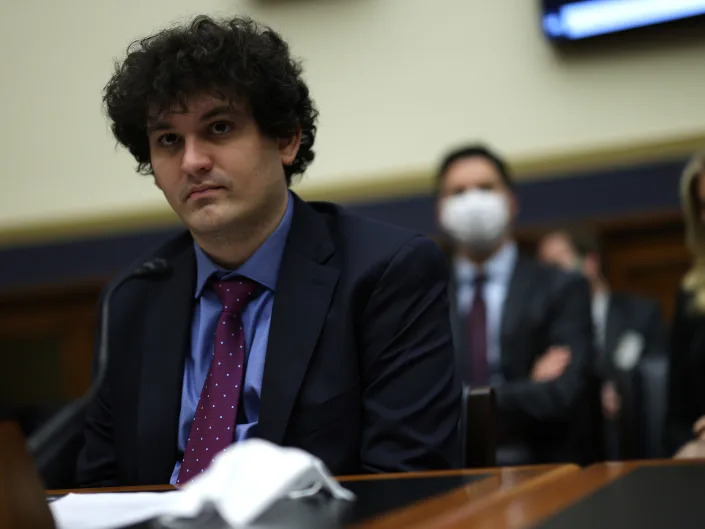
The FTX cofounder Sam Bankman-Fried was arrested in the Bahamas Monday.
Sam Bankman-Fried was arrested in the Bahamas Monday. The US SEC has charged him with fraud.
Bankman-Fried's law-professor parents were spotted Tuesday at their son's hearing in the Bahamas.
As his troubles unravel, his high-profile family is under the spotlight.
Sam Bankman-Fried was raised in an academic family in Silicon Valley. He grew up playing games like chess and bridge.
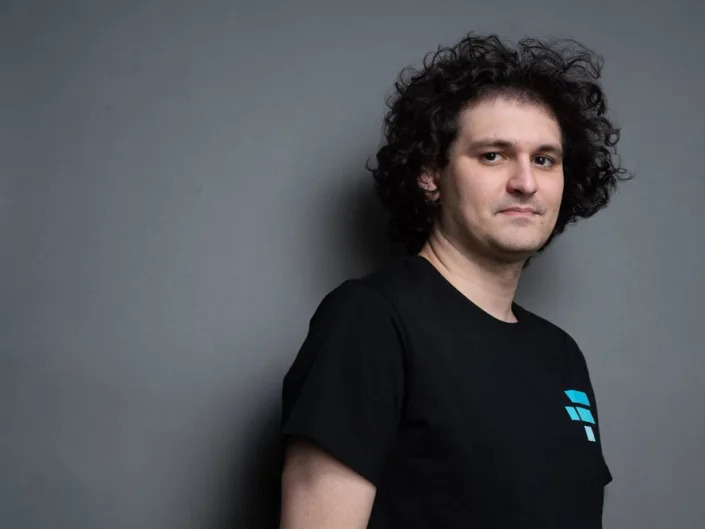
Bankman-Fried cofounded FTX in 2019 and was its CEO.FTX
The FTX founder Sam Bankman-Fried was arrested in the Bahamas Monday, in a spectacular fall from grace after his crypto exchange collapsed last month.
Bankman-Fried — whose wealth peaked at an estimated $26 billion in March, according to the Bloomberg Billionaires Index — has been charged with fraud by the US Securities and Exchange Commission. A judge in the Bahamas denied him bail Tuesday.
As his troubles unravel, Bankman-Fried's high-profile family has been in the spotlight. His parents were spotted Tuesday at their son's hearing in the Bahamas and have been living with him on the island nation for over a month.
In November, Reuters reported a $16.4 million house in the Bahamas listed Bankman-Fried's parents, Joseph Bankman and Barbara Fried, as signatories. The house is in a gated community with beach access and was described in property records as a vacation home.
Last month, Bankman-Fried told Andrew Ross Sorkin at the New York Times DealBook Summit that he called his parents when FTX was collapsing. He added that his parents "bore no responsibility" for FTX's downfall.
"Anyone close to me, including my parents and employees and coworkers, who fought with the company to push forward, they were hurt by this," Bankman-Fried said. "They bore no responsibility for that. I feel really bad about that. I feel really grateful for the support my parents are still giving me throughout all of this."
We rounded up some of the prominent members of Bankman-Fried's family. Bankman and Fried did not immediately respond to a request for comment sent to a spokesperson outside regular business hours. His brother, Gabriel Bankman-Fried, and aunt Linda Fried also did not immediately respond to requests for comment sent outside regular business hours.
His father, Joseph Bankman, is a Stanford Law professor who's also a clinical psychologist.

Joseph Bankman has postponed his class that was set to start in January amid the FTX fallout.
Bankman, a law professor at Stanford University, is Bankman-Fried's father.
Described in his official biography as a "leading scholar in the field of tax law," Bankman teaches mental-health law and is a scholar who writes about law and psychology.
Bankman was also a paid FTX employee for nearly a year before the exchange collapsed, a spokesperson for Bankman and Fried told The Wall Street Journal Monday. He was mostly working on charity projects at FTX, the spokesperson told the media outlet.
Bankman had a law class that was scheduled to start in January, but that has been pushed back until the spring as he remains in the Bahamas with his son, according to The Journal.
The lawyer earned a Juris Doctor from Yale Law School in 1980, according to his biography on Stanford's website.
His mother, Barbara Fried, is a professor emerita of law at Stanford.

Barbara Fried cofounded Mind the Gap, a super PAC.
Bankman-Fried's mother is also a law professor at Stanford University.
Her scholarly interests are "at the intersection of law, economics, and philosophy," according to her biography on the university's website.
Fried cofounded Mind the Gap, a super political action committee that uses statistical analysis to determine the dollar-value influence of donations on Democrats running for the House of Representatives. She resigned from Mind the Gap in November, The New York Times reported. The Times did not specify why she resigned.
Fried retired from teaching in September and didn't have plans to teach this year, a spokesperson told The Journal.
She graduated from Harvard with a Juris Doctor in 1983, according to her biography on the Stanford site.
His younger brother, Gabriel Bankman-Fried, founded and ran a nonprofit called Guarding Against Pandemics — which was in part funded by his sibling.

Gabriel Bankman-Fried stepped down as the director of Guarding Against Pandemics in mid-November.
Gabriel Bankman-Fried is Sam Bankman-Fried's younger brother.
In 2020, Gabriel Bankman-Fried founded and ran the nonprofit Guarding Against Pandemics, which aims to prevent another pandemic. The nonprofit was partly funded by Sam Bankman-Fried, Puck reported.
The two brothers have spent at least $70 million since October 2021 on research projects, campaign donations, and initiatives that hope to boost biosecurity and pandemic prevention, The Washington Post reported.
Gabriel Bankman-Fried stepped down as the director of the nonprofit in mid-November, The Post said.
His aunt Linda Fried is the dean of the public-health school at Columbia University.

Linda Fried is a public-health expert.
Fried, the dean of Columbia University's public-health school, is Sam Bankman-Fried's aunt, according to The Washington Post.
Described on the school's website as a "leader in the fields of epidemiology and geriatric medicine," Fried was trained in cardiovascular and chronic disease, epidemiology, and geriatrics.
Fried graduated from Rush Medical College in 1979 with a doctor of medicine and got a master's in public health from the Johns Hopkins Bloomberg School of Public Health in 1984, her biography on the Columbia website says.



